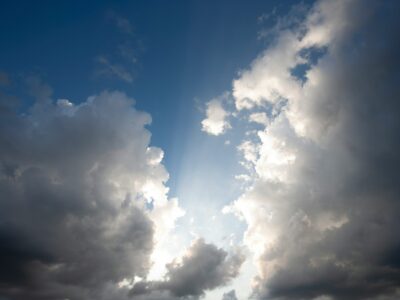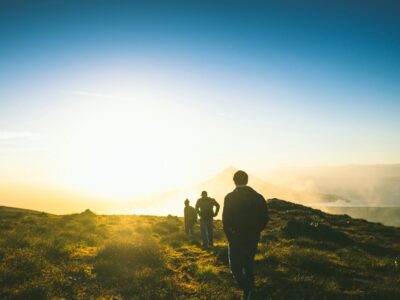I haven’t thought much about dirt. It’s what we bring into the house. It’s what we sweep under the rug. It’s everywhere. When something is everywhere, we don’t tend to acknowledge its value. Like fresh water, or fresh air, or fresh and plentiful food, we take the ground for granted, because it’s always been there. It’s literally our foundation, the ground beneath our feet, the stuff we came from and the stuff to which we’ll return. Dust.
But when water is scarce, its value increases. When air is polluted, we long to breathe easier. When we don’t have food, one whole, crisp apple becomes like gold. And when the ground beneath our feet erodes away to nothing, rich and fertile soil becomes a treasure trove.
Unless you’re a farmer or a gardener, dirt is just a nuisance you have to clean up. Kiss the Ground takes a closer look and in the process, reveals a potential solution to some of our greatest environmental challenges.
Kiss the Ground: What to Expect
The documentary Kiss the Ground is narrated by Woody Harrelson. The full version is available on Netflix or Vimeo, and a version for school systems has recently been released, which can be viewed for free by any students, teachers, or schools. It uncovers our relationship with the ground and the way our agricultural practices have impacted the health of our soil over the centuries, gradually and sometimes rapidly depleting the nutrients in the soil, resulting in the “desertification” of massive amounts of formerly rich land.
Kiss the Ground also offers hope for how regenerative agricultural practices can restore nutrients to the soil and actually reverse the effects of a changing climate. If you recall from science class, plants “inhale” carbon dioxide and “exhale” oxygen. Where does the carbon go? Back into the soil, which holds onto it like a safe deposit box. With regenerative farming principles like no-till farming and crop biodiversity, and more, the soil maintains its richness, captures carbon, and creates a healthier environment for everyone, all while producing more crops and yielding a greater harvest. Win win!
Finding the Love: Faithifying Your Viewing
I grew up helping on our family’s farm. The food we consumed grew out of the soil beneath our feet. The minerals of the earth make up my bones and my skin. If cells could reminisce, then the neurons that are thinking about soil are reminiscing right now about their days as dust. We are connected to all things, even this ground, even this soil.
We are living in the literal depletion of our soils, the literal moment where rivers are turning to wastelands, springs of water into sunbaked mud, and orchards to alkali flats because of the evil people who live here (Psalm 107:33-41 MSG). Our metaphors in Scripture point us to a barrenness, a fruitlessness, a famine when our spiritual and physical lives are robbed of the nutrients we need because of greed, waste, abuse, and disregard for the sacredness of all things. When we stop treating ourselves, others, animals, and the ground with love, we desecrate it—we de-sacred it—we treat it as if it is not sacred.
But God, of course, shows us his way, and his way is a way of resilience and hope. There is a way out, a way back, to sacredness, to restoration. The psalmist in Psalm 133 says that God “changed wasteland into fresh pools of water, arid earth into springs of water, Brought in the hungry and settled them there; they moved in—what a great place to live! They sowed the fields, they planted vineyards, they reaped a bountiful harvest” (Psalm 107:33-41 MSG).
How? How does this happen? “Repent,” John the Baptist called, “for the kingdom of heaven has come near” (Matthew 3:2 NIV). The word “repent” means “to change one’s mind,” or “to turn,” to turn back to the Way and the Light. We’ve been shone a way to live that honors the sacred in all things, a way to return to the Garden of Eden, where God called everything he had made very good, and it is shone through Jesus Christ, who called us back to love.
But even before this, God was showing us how to live in such a way as to love the earth and give everything a rest. Sabbath is not just for humans and it is not just for God. Sabbath is for the earth, too.
“Sow your land for six years and gather in its crops, but in the seventh year leave it alone and give it a rest so that your poor may eat from it. What they leave, let the wildlife have. Do the same with your vineyards and olive groves” (Exodus 23:10-11 MSG). Give it a rest. Let the soil replenish. Leave it alone. This is done with an awareness of both the poor and the wildlife both, human and non-human, all created very good.
More detail was given to the Israelites again in Leviticus: “God spoke to Moses at Mount Sinai: “Speak to the People of Israel. Tell them, When you enter the land which I am going to give you, the land will observe a Sabbath to God. Sow your fields, prune your vineyards, and take in your harvests for six years. But the seventh year the land will take a Sabbath of complete and total rest, a Sabbath to God; you will not sow your fields or prune your vineyards. Don’t reap what grows of itself; don’t harvest the grapes of your untended vines. The land gets a year of complete and total rest. But you can eat from what the land volunteers during the Sabbath year—you and your men and women servants, your hired hands, and the foreigners who live in the country, and, of course, also your livestock and the wild animals in the land can eat from it. Whatever the land volunteers of itself can be eaten” (Leviticus 25:1-7 MSG).
Rest and restoration of the land are not just metaphors for our spiritual lives; these are real and necessary practices for our physical lives, our physical bodies, and our physical earth. God built the whole system (the whole ecosystem) to work in health, in love, interconnected and interdependent upon each and every living thing. We need rest. The earth needs rest. And in that rest, we shall see renewed abundance and hope for the future. God said so.





 Copyright
2024
Root and Vine
Copyright
2024
Root and Vine